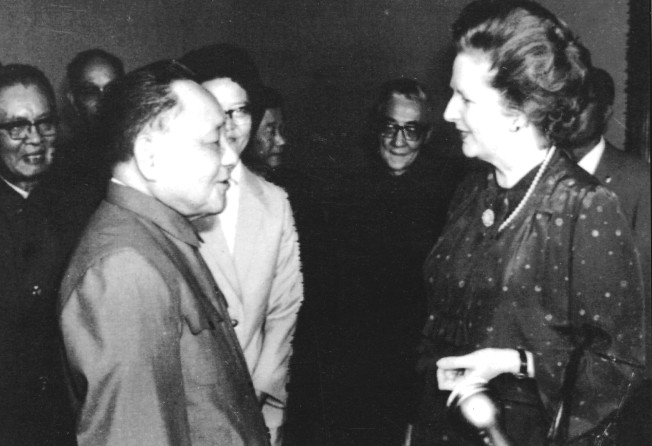Britain adjusted tactics to sway Chinese leaders ahead of Joint Declaration visit in 1984
Background notes from 1984 visit show UK manoeuvring before Joint Declaration signed

Britain used different tactics in dealing with different Chinese leaders, believing that individual leaders' relative hierarchy and personal styles required adjustments to achieve goals.
In background notes of November 1984 for then Prime Minister Margaret Thatcher's visit to China the following month, the Hong Kong Department of the British Foreign and Commonwealth Office said the aim of the visit was to establish a climate of trust and goodwill in which the joint declaration could be put into effect.
"There are a number of outstanding points that will, in due course, need to be discussed with the Chinese. Some are sensitive and are better not raised at the highest level in order to avoid the risk of a rebuff at that level which would block further progress," the notes said.
"There is a strong negative aim, to avoid provoking a high-level statement from Chinese leaders inimical to our aims," the notes cautioned.
"But [premier] Zhao Ziyang is a practical man, and it would be helpful to explain to him in general terms our thinking about the Basic Law and the administration up to 1997."
The Foreign Office noted that Deng Xiaoping , who put forward the "one country, two systems" concept, had maintained a close interest in Hong Kong throughout the talks.
"He is the Chinese leader who had the ultimate say in decisions on Hong Kong's future.
He did not follow all the detail of the negotiations but appears to have intervened decisively, and not always helpfully, on a number of key points," the notes said.
Heeding the advice, Thatcher did not raise the issue of Hong Kong's constitutional development nor of the drafting of the Basic Law during her talks with Deng in December that year.
Instead she raised the issues during her meeting with Zhao, who diplomatically replied that he was not prepared to make any comment on constitutional development during the transitional period.
According to the Foreign Office notes, the British government hoped that it would be able to influence the drafting of the Basic Law more directly through the Sino-British Joint Liaison Group.
Thatcher wrote in her 1993 memoirs, The Downing Street Years, that Zhao's "moderation and reasonableness" were a great handicap to him in his subsequent career. Zhao was ousted in 1989 because of his sympathy with the Tiananmen Square pro-democracy movement before the bloody crackdown.
The South China Morning Post understands that Britain and China had informal discussions on the Basic Law in the liaison group when the mini-constitution was being drafted, starting from 1985.
Britain offered informal advice on the drafting of the Basic Law as many Hong Kong drafters discussed the matter with the Hong Kong government.
Former chief executive Donald Tsang Yam-kuen was one of the Hong Kong officials who approached the local drafters. Tsang was deputy secretary of the General Duties Branch between 1985 and 1989 and was responsible for the implementation of the joint declaration.
Meanwhile, British officials strived to ensure the signing of the joint declaration took centre stage during Thatcher's visit, to avoid the perception that Britain was selling out Hong Kong for London's commercial interests.
On November 14, 1984, then foreign secretary Geoffrey Howe discussed with Thatcher the possibility that she might include some businessmen as part of her delegation to China.
But in a telegram to the Foreign Office on November 16, 1984, then Hong Kong governor Edward Youde emphasised the need to avoid the impression in Hong Kong that Britain's commercial interests were an important factor behind its decision to reach an agreement with Beijing on the future of the city.
Peter Ricketts, Howe's then private secretary wrote in a note on November 16, 1984, that the foreign secretary was disposed to accept the governor's advice.
He said "there would be suggestions that we were now getting our prize for having sold out Hong Kong to the Chinese". "Accusations of this kind might be extremely damaging," he said.